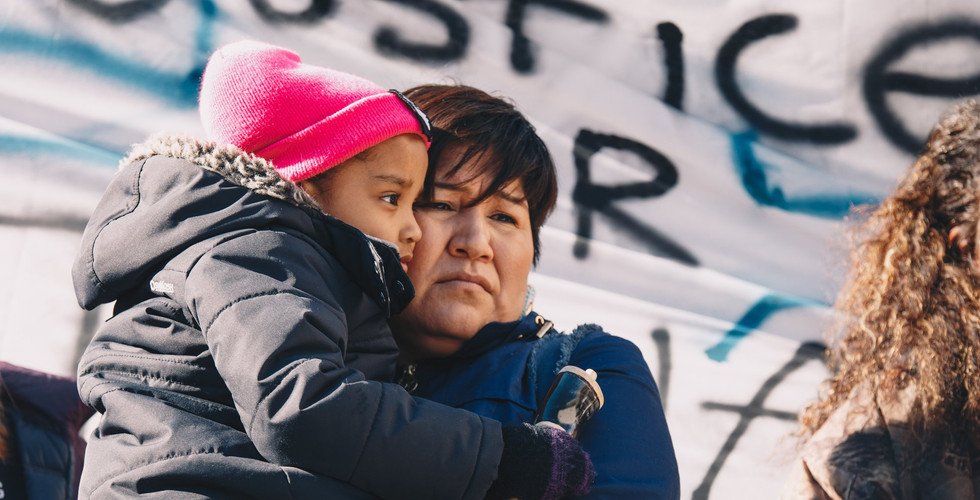Indigenous youth organize rally following verdict of Tina Fontaine’s death
- Kelsey De Melo
- Mar 5, 2018
- 3 min read

People gathered in Toronto with signs demanding justice after the unresolved death of 15-year-old Tina Fontaine. Saturday March 3, 2018. (Nicole Brumley/ Ryerson School of Journalism)
A crowd of over 1,000 people gathered at Nathan Phillips Square on Saturday to demand justice for Tina Fontaine as well as to protest the injustices that Indigenous youth are facing across the continent.
Tina Fontaine, a 15-year-old Indigenous girl from Sagkeeng First Nation in Manitoba, was found dead in 2014 after her body was dragged out of the Red River in Winnipeg. Almost four years later and still no answers or justice have been granted for Tina or her family.
The rally in Toronto was organized by 16-year-old Madyson Arscott who said the tragedy of Fontaine’s death, as well as the inequality that the Canadian justice system is founded upon, inspired her to take action.
Last week, the justice system proved to fail Indigenous youth yet again when they found 56-year-old Raymond Cormier not guilty in the murder of Fontaine.
“The death of Tina Fontaine took the breath out of me and made me lose the bounce in my step because there was absolutely nothing she could have done to deserve this,” Arscott said as they fought through tears to speak. “I took action in this injustice as soon as I could because it reminded me that Indigenous women have always been on the front lines of this fight.”
The rally was a response to the inequality in the Canadian justice system that failed Fontaine, but it was also a response to a much larger issue. Fontaine was not only failed by the criminal justice system; she was failed by every system she encountered, including Manitoba’s Child and Family Services who was responsible for Fontaine’s care before her body was wrapped in a duvet and weighed down by rocks in the Red River.

Sixteen-year-old Madyson Arscott organized the rally in Toronto where they fought through tears to speak about the death of Tina Fontaine. Saturday March 3, 2018. (Nicole Brumley/ Ryerson School of Journalism)
Arscott says that they had an indescribable appreciation for the Indigenous women who came before them, who had to sacrifice everything just so they could be here today. Despite only being 16 years-old, Arscott says they intend to continue the fight for Indigenous women to ensure that their children can one day live safely on this land.
Youth have always been at the forefront of social movements and have always understood that if they want their futures to look differently, that difference must initially come from them.
“I took action in this injustice as soon as I could because it reminded me that Indigenous women have always been on the front lines of this fight.”
Zico, another 16-year-old Indigenous teenager, attended the rally where he spoke passionately about the need to raise awareness around the root of all Indigenous issues: colonization and genocide.
“It terrifies me to know that when Indigenous women are murdered, justice is not served,” Zico said. “This is not an isolated incident, there are over 4,000 unsolved cases of missing and murdered Indigenous women and that number continues to rise.”
Both Arscott and Zico agree that while the not-guilty verdict was deeply upsetting, it was unfortunately not surprising to either of them.
Canada’s justice system has continued to fail Indigenous youth time and time again, but while some people claim that the system is broken and in need of reform, Arscott has a different perspective. They said that the justice system is in fact not broken, and that it is working more effectively than ever, because it was designed to work against Indigenous people.
Charlie Angus, NDP MP, was also in attendance and spoke briefly about the importance of supporting our youth like Arscott and Zico who are going to be the ones to evoke real change.
“I want to pay tribute to Tina Fontaine because our nation failed her,” Angus said. “A tragedy is when you walk out the front door and get hit by a bus, but when children continue to die in this way it is no longer a tragedy, it is genocide.”
Arscott is aware that they may not be able to see the results of her efforts in their lifetime, but said that if change is to ever come the work needs to start now.
“To my marginalized young people, you are fighting against a world that is trying to keep you down,” Arscott said. “But if I can get one thing across to you today, it is that there is resistance in your simple existence.”













Comments